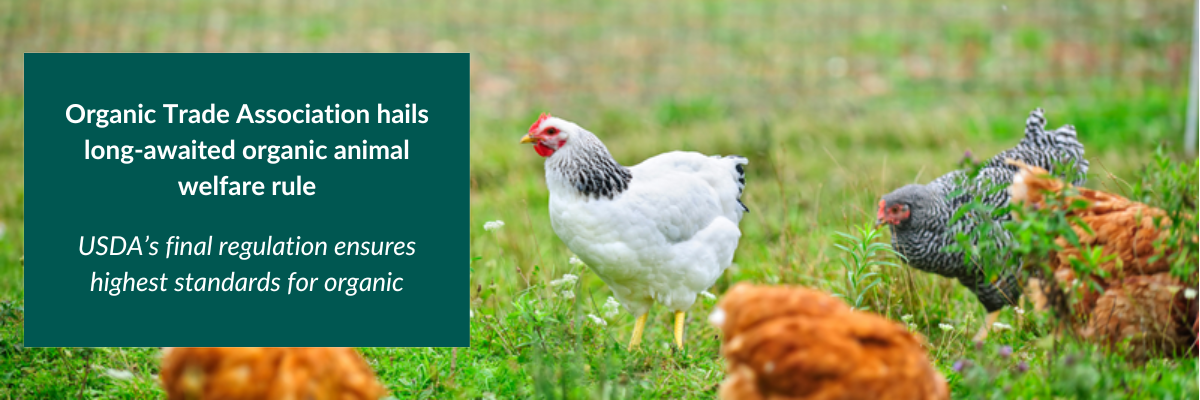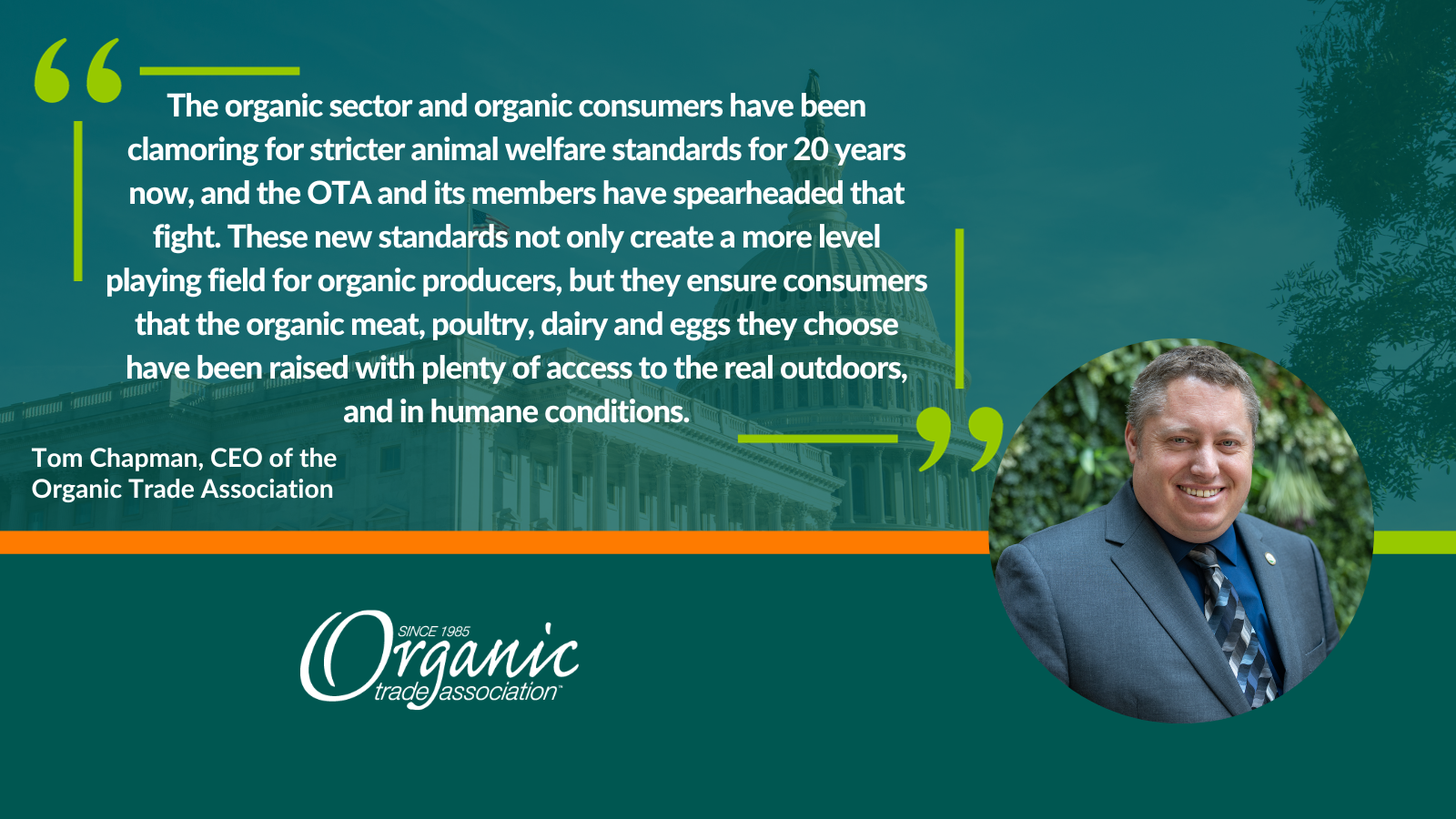The final Organic Livestock and Poultry Standards (OLPS) regulation, announced on October 25, 2023 by the USDA, creates clear standards for outdoor access for organic poultry including minimum indoor and outdoor space requirements, and further clarifies living conditions, healthcare, transportation, and slaughter practices for all organic avian and mammalian livestock species. Most importantly, the rule clarifies that screened-in, enclosed porches do NOT qualify as sufficient outdoor space for organic chickens. Current organic poultry producers have up to five years to implement the new regulations.
The USDA on October 25, 2023 announced its final Organic Livestock and Poultry Standards (OLPS) regulation.
Almost twenty years in the making, the new rules would not have happened without the persistence of your trade association and our dedicated members. These new standards not only create a more level playing field for organic producers, but they ensure consumers that the organic meat, poultry, dairy, and eggs they choose have been raised with plenty of access to the real outdoors, and in humane conditions.
Having clear, consistent and enforceable standards is paramount for the organic sector to maintain consumer trust, and to also ensure that farms and businesses of all sizes have a fair shot at competing in the marketplace by meeting a minimum set of requirements.
| OLPS Final Rule Summary | Press Release | Letter from OTA's CEO |
Blue
Stay tuned for upcoming OLPS education opportunities.
Blue
The trade assocaition, along with thousands of organic stakeholders and consumers, urged the U.S. Department of Agriculture (USDA) to swiftly implement a final Organic Livestock and Poultry Standards (OLPS) rule – strengthening organic animal welfare standards is long overdue and critical for the sustainability of family farms, the advancement of organic, and continued consumer trust in the USDA Organic seal.
USDA published the Organic Livestock and Poultry Standards (OLPS) proposed rule on August 9, 2022 in response to years of industry advocacy and a lawsuit filed by OTA. The rule was open for comment through November 10, 2022 and drew overwhelming public support. Initial analysis shows that out of the nearly 40,000 posted comments, a huge 89 percent marjority are in favor of this regulation being finalized and implemented. The rule ensures that organic animals have true outdoor access and close regulatory loopholes that have led to uneven animal welfare standards and unfair conditions for organic farmers who are already raising their birds by the highest organic practices.
The comments OTA submitted were highly representative of the organic poultry industry. The were informed and supprted by feedback from 579 organic poultry operations producing some 90 million organic chickens and 10 accrredited certifiers that certify more than 1,500 poultry operations. Read the full press release.
Health and competitiveness of family farms – inconsistent animal welfare standards for organic chickens create an unlevel playing field for organic farmers already providing true outdoor access.
Advancement of organic animal welfare – 75% of Americans are either very or somewhat concerned about the treatment of animals by the meat and dairy industry.
Consumer trust and integrity of the organic label – 89% of Americans say the USDA should periodically review and update the organic standards to keep pace with new science and consumer expectations.
OLPS clarifies the production standards of avian and mammalian livestock as authorized by OFPA to support consistent enforcement across producers and alleviate market failure by assuring consumers that USDA-certified organic livestock products meet a robust and uniform standard. The proposed rule:
- Establishes poultry indoor and outdoor space requirements and stocking density limits. Enclosed porches are not considered outdoor spaces.
- Clarifies living conditions, healthcare, transportation and slaughter practices to support animal welfare for mammalian livestock species.
- Acknowledges that current conditions are causing consumer confusion and market failure.
- Adopts the position that the Organic Foods Production Act provides the requisite authority for regulations regarding livestock and poultry health care practices and living conditions – including regulations regarding animal welfare.
“After 20 years stuck in limbo, organic animal welfare reforms are finally back on the agenda at USDA,” says OTA CEO & Executive Director Tom Chapman. “The Organic Trade Association welcomes the release of the Organic Livestock and Poultry Standards proposed rule, which will level the playing field for organic producers and raise the bar so that the highest standard of care becomes the baseline.”
Read the full press release.
| OLPS 2022 Proposed Rule Summary | OLPS 2022 Proposed Rule Full Text |
Organic livestock and poultry producers have been clamoring for more robust animal welfare standards for nearly 20 years – almost as long as the Organic Foods Production Act (OFPA) has existed. The current USDA National Organic Program regulations require that all certified organic operations give their animals “access to the outdoors, shade, shelter, exercise areas, fresh air, clean water for drinking, and direct sunlight.” Unfortunately, these regulations have not been consistently enforced, resulting in some large companies utilizing narrow, enclosed porches for poultry instead of true outdoor access to meet this requirement.
After years of public engagement in the rulemaking process, The U.S. Department of Agriculture (USDA) published the Organic Livestock and Poultry Practices (OLPP) in 2017, only for it to be abruptly rescinded by the Trump Administration. In response, OTA filed a lawsuit against USDA (ongoing). In response to the lawsuit and continued pressure from the organic industry, USDA published the new proposed version of this rule – the Organic Livestock and Poultry Standards (OLPS) – publishing the rule on October 25, 2023.
Blue
Timeline
1995 – 2000 │ NOSB releases recommendations on animal welfare
2002 │ Organic regulations are implemented that include healthcare practices, outdoor access and living condition requirements for livestock
2002 │ A sustained appeals decision results in inconsistent application of the outdoor access standards for organic poultry
2010 │ USDA OIG releases an audit identifying inconsistencies in outdoor space for organic livestock
2011 │ NOSB adopts a set of recommendations to define further, clarify and incorporate production practices for organic livestock to advance animal welfare
2016 │ USDA releases Organic Livestock and Poultry Practices (OLPP) proposed rule
2017 │(Jan.) USDA issues final OLPP rule
2017 │(Feb.) Trump administration delays the effective date of the OLPP final rule
2017 │(Sep.) OTA files a lawsuit against USDA for failure to put the new organic livestock standards in effect
2018 │ USDA withdraws the OLPP regulation
2021 │ Biden administration indicates their interest in reconsidering OLPP and plans a new rulemaking process
2022 │ USDA releases new Organic Livestock and Poultry Standards (OLPS) proposed rule
2023 │ USDA announced its final Organic Livestock and Poultry Standards (OLPS) regulation


